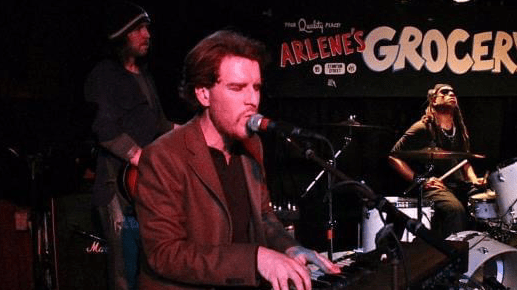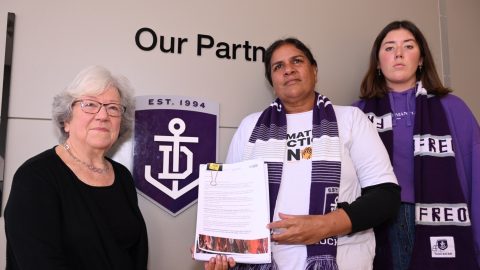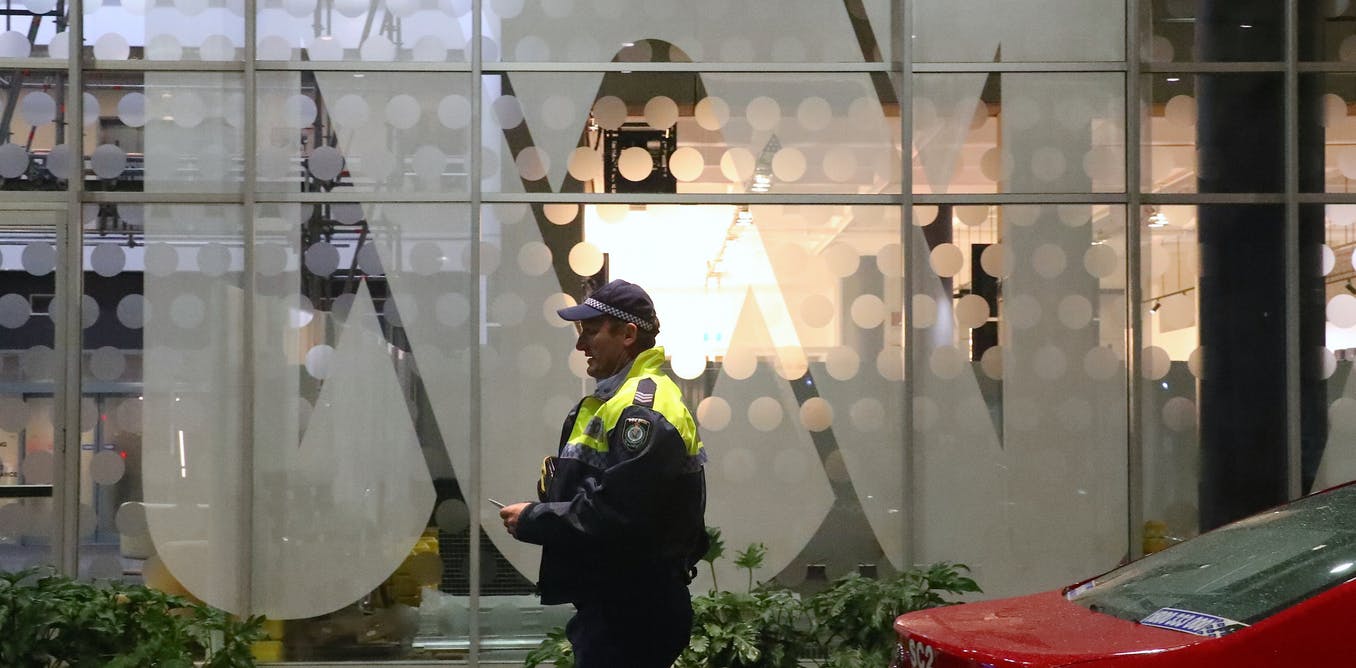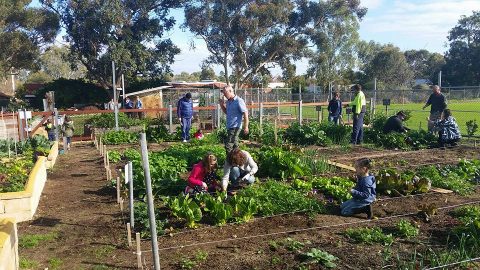In the olden days, which some of us vaguely remember, there would often be some fellow, astride a soapbox in a public park, declaiming loudly to bemused passers-by: ‘The End is Nigh!’ Occasionally, this fellow was of religious persuasion, urging us to Repent. But often his message was purely secular: The world is doomed and humankind is about to fall off a cliff.
In Australia, climate was often the motivation for dire forecasts. We had the likes of Hanrahan lamenting, in the immortal words of his creator – a bush poet who went under the pen-name of John O’Brien, disguising his earthly incarnation as Patrick Joseph Hartigan, a Catholic priest who clearly kept an eye on the weather:
‘If we don’t get three inches, man,
Or four to break this drought,
We’ll all be rooned,’ said Hanrahan,
‘Before the year is out.’

Western Desert, Australia. Credit Michael Barker
Weather patterns are front and centre in daily discourse. Perhaps it was always thus. We can imagine early cave dwellers arising at first light and peering outside at the sky. One suspects they were pretty good observers, even without a phone app that enables us moderns to tap into the radar before deciding whether or not to take the brolly.
We might wonder what Hanrahan would have made of the flooding rains that have drowned much of our eastern continent? Would he have scribbled away in his notebook, as the rivers rose?
‘If we don’t fill the sandbags soon,
And raise the levies high
We’ll all be rooned, no shred of doubt,
As waters reach the sky.’
These strange days, I find myself musing about ruination. Maybe it’s a function of growing old, weary in the bones, and reconciling oneself to the inevitable process of decay. But it’s also a lot to do with gloomy prognostications about our collective future. Are we staring into an abyss, in the grip of a ‘climate crisis’ as the planet warms, creating a ripple effect that has already got beyond the point of no return? We are bombarded with messages that we have reached, or are near to reaching, a tipping point. Unless there is a drastic reduction in fossil fuel consumption and a much stronger emphasis upon replacement energy sources that go under the rubric of ‘renewable’, we will be ‘rooned’ – in fact, well and truly rooted and rooned beyond anything Hanrahan might have imagined.
I fight inwardly against such a pessimistic outlook. Surely it is within our capacity to change course, even if we are dealing with a glacial response, akin to a global Queen Mary, for whom the slightest movement takes time and effort? Well, I guess the jury is still out. So I find myself oscillating between abject despair and an occasional shooting star of hope and inspiration.
The rivulet of intermittent optimism was recently boosted by a couple of Fremantle Shipping News podcast interviews. Peter Newman and Bill Hare reported upon COP27. I found both conversations fascinating and informative. We can read about major conferences and catch snippets on the radio or TV news. But these are usually fragmentary and selective. To hear from two participants who have devoted much of their working lives to environmental issues gives a much better window into what is happening, both on the world stage and locally. If I was to describe the tone and content of Peter’s contribution it would be a mix of enthusiasm and realism. Bill, who has been to every COP conference (bar one that he attended via Zoom) came across as forthright and attuned to political realities. These gentlemen have been and remain at the coalface (for want of a better term). We can be grateful to have them on our doorstep in Western Australia.
Yet, here’s the rub. My attempts to share these discussions, via Facebook and in conversations with friends, have largely fallen flat. I get the sense that, for most of us, issues around global warming are so complicated that we shrug our shoulders and proceed with business as usual. Perhaps we do accept the broad consensus of scientific opinion about what it means for humanity if temperatures continue to rise beyond certain levels. But even though we might worry about the effect for future generations, compelling evidence is not immediately apparent (at least to those untouched by fire and flood) and any kind of apocalypse remains beyond our foresight. So, along with compassion fatigue, we unconsciously embrace a condition of ‘climate fatigue’. That’s the kind of stasis within which many of us dwell.
Conversely, there are others who make considerable effort to educate themselves and arrive at a worldview they regard as pragmatic and sensible. They may not be climate sceptics or deniers but they tend to frame their arguments around lemming-like consequences if we push too hard and too fast to end energy reliance on oil and gas and coal. They invoke images of ‘the lights going out’ or the economy blowing up, and with it, our standard of living. For them, any transition must be slow and steady. And they are quick to lecture others that energy generated by sun or wind is inherently unreliable, at least in the sense that it’s not on tap 365 days of the year. Their argument continues along a well-defined path – one that looks back to the Ice Age and beyond (‘Climate is always changing’) and one that fosters doubt around scientific certainty (‘contemporary science is skewed and based on inadequate premises to warrant radical action’). Such views tend to ignore or downplay present realities: the sharp escalation of severe weather events, island nations and coastal communities in danger of disappearing under water, melting permafrost, glaciers, and the ice sheets of the Arctic and Antarctic, loss of habitat and species, proliferation of pollutants in the air and oceans, to name some key areas. These flow-on effects are, in some eyes, collateral damage, not warranting the push of the panic button.
Glancing across the world stage, my guess is that the ‘slow but steady’ approach carries general endorsement. Even where people recognise the need for action, they dig their heels in if that action comes at a personal cost. Politicians gauge the mood and frame policies (or non-policies) accordingly. To paraphrase Paul Keating: ‘if you want to bet on a horse race, back the nag called Self-Interest’.
This introduces the notion of values. Unchecked global warming, as far as I understand the prevailing wisdom, will cause more harm and chaos in poorer countries and communities than the concomitant impact in the so-called developed world, with our better access to food, clean water, decent housing, and a myriad of modern amenities. Though we won’t be immune, our lifestyles – at least in the short term – will be less impacted compared with the circumstances of those who, by virtue of location and social and economic inequality, will be much more severely affected.
With this in mind, is there a moral obligation for countries – and the individuals who live there – to make some form of sacrifice as we wean ourselves away from fossil fuels and tread a new and precarious path towards energy sources that appear to be more benign? I think many of us who have enjoyed decades and decades of prosperity and comfort levels unimaginable to our more recent ancestors, may recognise that the good times cannot roll on forever. And part of this recognition – if it is embedded in our value systems – is that, in a world of 8 billion people, we are a very privileged minority. Does this recognition of ingrained inequality touch us sufficiently – not to make us feel guilty – but to give meaning to our appreciation of ‘fairness’ and induce us to reappraise the living standards to which we have been accustomed?
Eight billion people. New projections suggest population growth will peak at around 10.4 billion by 2080. These figures, as far as I know, don’t factor in potential catastrophes such as pandemics far worse than Covid or nuclear warfare. But even if we focus on the present world population, we stumble into the issue of sustainability. At a time where globalisation is still, by and large, the economic cause célèbre, driven by notions of growth and consumption, it is hard to be confident the impact upon our planet will be anything like benign if 8 billion people strive for a lifestyle equivalent to the affluence that many of us now enjoy. Some commentators postulate this kind of lifestyle would only be possible with a world population of around half the current number.
Even if we assume projected population growth peaking around 10 billion, rather than any remarkable reduction, we are left with the vexatious question of how we can avoid ruining this Earth, while at the same time achieving universal prosperity and far greater equality, in terms of both opportunity and outcomes. For unless we address human aspirations, the chances are that any notion of sustainability will remain abstract and not rate a tinker’s cuss with ordinary folk who are simply struggling to keep their heads above water.
Since the fall of the Berlin Wall, the tides of the market economy and globalisation have appeared unstoppable. This has ushered in undoubted prosperity to many people in many countries. But, where unchecked, these economic forces have also led to a greater disparity in wealth distribution. Those at the top of the pile are ridiculously rich, while those at the bottom will be found on the street. Recently I was reading about somebody who went to take up a position in Silicon Valley. It was only on a day when they were forced to rely on public transport, that they saw the widespread homelessness and the obvious signs of poverty that existed in the very same neighbourhood where stood their shiny office towers, and where billionaires created devious algorithms to suck hapless consumers into a never-ending vortex. The story is salutary. It is evidence of a widespread disconnect – a disconnect that has ramifications in the way in which we value (or devalue) the health of our planet. The old Australian platitude ‘she’ll be right’ seems to operate as a pervasive undercurrent to our thinking and our inaction.
Of course, we are bombarded, not just daily, but moment to moment (assuming we have a television, phone or computer), by incessant advertising and enticement to spend money on goods and services. As I write, we are in the midst of this ridiculous extravaganza that goes by the name of ‘Black Friday sales’. The roads are jammed with traffic; the shops are full of eager beavers jostling for bargains. It reminds me of the adage that, in the Age of the Consumer, we are urged to spend money we don’t have on things we don’t need to impress people we don’t like.
Many years ago a wise English psychotherapist and paediatrician called Donald Winnicott promoted the concept of ‘good enough parenting’. Having kids, as many of us know, does not come with an instruction manual. It usually comes with the degree of anxiety and a desire to get things right. For Winnicott, 24/7 attunement to a child’s needs, beyond the early stages of development, not only sets the bar too high – but it also mitigates against a child developing resilience. It is healthier for both parent and child if the former is ‘good enough’ rather than seeking unattainable perfection.
Perhaps we could transpose these ideas to the way in which we live. If we perceive perfection and fulfilment to be found in owning a McMansion, buying a new outfit every other day, dining in the best restaurants, flying across the globe for an annual skiing holiday in a glitzy resort, and always being up-to-date with the latest iPhone model, we may be trundling along on a consumption treadmill that will never satisfy us, let alone sustain the exploited Earth from which these benefits are derived. I found myself musing that a ‘good enough lifestyle’ may be part of the answer. If we lower our expectations a notch, and ameliorate our desires, perhaps that would be one small way to contribute towards a better planetary future. Just saying.
Of course, pontificating from my rickety soapbox, as past experience bears out, is unlikely to change many hearts and minds. And there are enough contradictions in my life as a consumer to deter me from taking the high moral ground. Often, I feel like a character in a Leunig cartoon, pondering the meaning of life and overcome by the incessant trashing of old-fashioned values and the virtues of good citizenship. Sometimes, it’s tempting to put on the mask of positivity but I find it slips the moment I open my eyes. Where is the curiosity, and the spirit of robust enquiry, I say to myself, as I listen yet again to someone speaking as if they know all the answers (while others dive for cover or are content to talk about the football). I wish I could share a widespread belief that the human race has the ingenuity to figure things out. And I can only shake my head in wonder at those who show no empathy with the plight of millions of folk who get left behind or are eliminated altogether. That’s simply Darwinian theory at play, I’ve heard said.
The venerable Michael Leunig does offer a way out:

Leunig’s Declaration of One Person. Facebook page
Yes, soon I will not be here, at least in bodily form. Not be here to wallow in the well of ceaseless questioning. Not be here to react in frustration when people do not seem to share any sense of urgency. Not be here to indulge the misery of countless moments.
Wow! I can hear a background chorus. ‘Too much time on your hands. Act, not think. Meditate. Be grateful.’
Valid responses, to be sure. And I hear them. And I also take heart from those who are constantly reflecting, thinking, and acting. At 93 years of age, as I’ve previously written, the wonderful activist and Buddhist practitioner, Joanna Macy is delighted to be alive in this world of complexity and crises. Wouldn’t miss it for quids, she proclaims, though in terms more eloquent. I smile, and the inspiration returns. Life – Be In It!
Yes, be in it. I descend from the soapbox and kick it into the corner. Time to smell the jasmine. Time to watch the grapes forming on the vine in our courtyard. Time to talk to the willie wagtail who alights on our bench and chirps a friendly greeting. Time to bask in Nature’s beauty and in friendships of heart and mind. And time to give thanks for the preciousness of this life, and to embrace the peaks and valleys with as much awareness and fortitude as can be mustered.
Bugger Hanrahan. Rooned, be damned. Maybe, just maybe, hope will arise from the ashes of deflated optimism.
Maybe, just maybe – the end is not nigh. It may sound trite to say this but it does depend on us.
* Based in Fremantle, most of the time, Bruce Menzies is the author of three novels, a family history, and a recent memoir. Details at BruceJamesMenzies.com If you’d like to read more of Bruce Menzies’ work on Fremantle Shipping News or hear a fascinating podcast interview with him, look here!
While you’re here –
PLEASE HELP US TO GROW FREMANTLE SHIPPING NEWS
FSN is a reader-supported, volunteer-assisted online magazine all about Fremantle. Thanks for helping to keep FSN keeping on!
** Don’t forget to SUBSCRIBE to receive your free copy of The Weekly Edition of the Shipping News each Friday!







